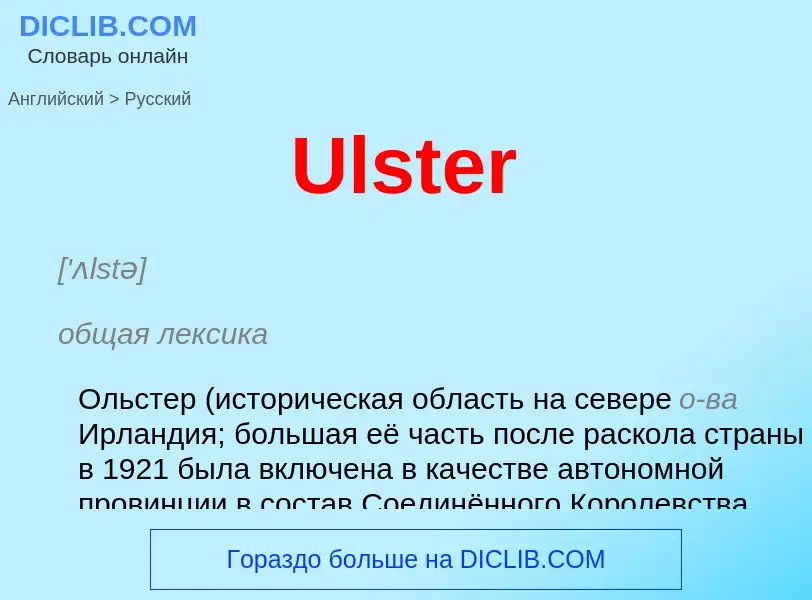Traduzione e analisi delle parole tramite l'intelligenza artificiale ChatGPT
In questa pagina puoi ottenere un'analisi dettagliata di una parola o frase, prodotta utilizzando la migliore tecnologia di intelligenza artificiale fino ad oggi:
- come viene usata la parola
- frequenza di utilizzo
- è usato più spesso nel discorso orale o scritto
- opzioni di traduzione delle parole
- esempi di utilizzo (varie frasi con traduzione)
- etimologia
Ulster - traduzione in russo
['ʌlstə]
общая лексика
Ольстер (историческая область на севере о-ва Ирландия; большая её часть после раскола страны в 1921 была включена в качестве автономной провинции в состав Соединённого Королевства [United Kingdom], получив официальное название Северной Ирландии [Northern Ireland])
разговорное выражение
Ольстер
синоним
существительное
разговорное выражение
Северная Ирландия
история
Ольстер
['ʌlstə]
общая лексика
ольстер (длинное просторное пальто из грубошёрстного сукна; обыкн. с поясом, иногда с капюшоном)
первоначально шилось из ирландского бобрика [Ulster frieze]
существительное
общая лексика
ольстер
длинное свободное пальто (обыкн. с поясом)
длинное свободное пальто (с поясом)
Definizione
Wikipedia
Ulster (; Irish: Ulaidh [ˈʊlˠiː, ˈʊlˠə] or Cúige Uladh [ˌkuːɟə ˈʊlˠə, - ˈʊlˠuː]; Ulster Scots: Ulstèr or Ulster) is one of the four traditional Irish provinces. It is made up of nine counties: six of these constitute Northern Ireland (a part of the United Kingdom); the remaining three are in the Republic of Ireland.
It is the second-largest (after Munster) and second-most populous (after Leinster) of Ireland's four traditional provinces, with Belfast being its biggest city. Unlike the other provinces, Ulster has a high percentage of Protestants, making up almost half of its population. English is the main language and Ulster English the main dialect. A minority also speak Irish, and there are Gaeltachtaí (Irish-speaking regions) in southern County Londonderry, the Gaeltacht Quarter, Belfast, and in County Donegal; collectively, these three regions are home to a quarter of the total Gaeltacht population of Ireland. Ulster-Scots is also spoken. Lough Neagh, in the east, is the largest lake in the British Isles, while Lough Erne in the west is one of its largest lake networks. The main mountain ranges are the Mournes, Sperrins, Croaghgorms and Derryveagh Mountains.
Historically, Ulster lay at the heart of the Gaelic world made up of Gaelic Ireland, Scotland and the Isle of Man. According to tradition, in ancient Ireland it was one of the fifths (Irish: cúige) ruled by a rí ruirech, or "king of over-kings". It is named after the overkingdom of Ulaid, in the east of the province, which was in turn named after the Ulaid folk. The other overkingdoms in Ulster were Airgíalla and Ailech. After the Norman invasion of Ireland in the 12th century, eastern Ulster was conquered by the Anglo-Normans and became the Earldom of Ulster. By the late 14th century the Earldom had collapsed and the O'Neill dynasty had come to dominate most of Ulster, claiming the title King of Ulster. Ulster became the most thoroughly Gaelic and independent of Ireland's provinces. Its rulers resisted English encroachment but were defeated in the Nine Years' War (1594–1603). King James I then colonised Ulster with English-speaking Protestant settlers from Great Britain, in the Plantation of Ulster. This led to the founding of many of Ulster's towns. The inflow of Protestant settlers and migrants also led to bouts of sectarian violence with Catholics, notably during the 1641 rebellion and the Armagh disturbances.
Along with the rest of Ireland, Ulster became part of the United Kingdom in 1801. In the early 20th century, moves towards Irish self-rule were opposed by many Ulster Protestants, sparking the Home Rule Crisis. In the last all Ireland election (1918 Irish general election) counties Donegal and Monaghan returned large Sinn Féin (nationalist) majorities. Sinn Fein candidates ran unopposed in Cavan. Fermanagh and Tyrone had Sinn Fein/Nationalist Party (Irish Parliamentary Party) majorities. The other four Counties of Ulster had Unionist Party majorities. The home rule crisis and the subsequent Irish War of Independence, led to the partition of Ireland under the Government of Ireland Act 1920. Six Ulster counties became Northern Ireland, a self-governing territory within the United Kingdom, while the rest of Ireland became the Irish Free State, now the Republic of Ireland.
The term Ulster has no official function for local government purposes in either state. However, for the purposes of ISO 3166-2:IE, Ulster is used to refer to the three counties of Cavan, Donegal and Monaghan only, which are given country sub-division code "IE-U". The name is also used by various organisations such as cultural and sporting bodies.

![A bronze statue commemorating The [[Flight of the Earls]] at [[Rathmullan]] in north [[County Donegal]]. A bronze statue commemorating The [[Flight of the Earls]] at [[Rathmullan]] in north [[County Donegal]].](https://commons.wikimedia.org/wiki/Special:FilePath/Bronze statue - geograph.org.uk - 821113.jpg?width=200)
![A modern Protestant mural in [[Belfast]] celebrating [[Oliver Cromwell]] and his activities. A modern Protestant mural in [[Belfast]] celebrating [[Oliver Cromwell]] and his activities.](https://commons.wikimedia.org/wiki/Special:FilePath/Oliver Cromwell mural (2736627207).jpg?width=200)
![Royal Avenue, [[Belfast]]. [[Photochrom]] print circa 1890–1900. Royal Avenue, [[Belfast]]. [[Photochrom]] print circa 1890–1900.](https://commons.wikimedia.org/wiki/Special:FilePath/Royal Avenue Belfast2.jpg?width=200)



![Fintown station]]. Fintown station]].](https://commons.wikimedia.org/wiki/Special:FilePath/Fintown Railway on trackbed of CDR County Donegal Railway, Lough Finn (5951398952).jpg?width=200)

